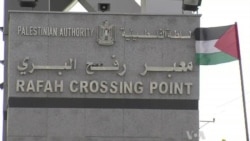RAFAH, GAZA —
Palestinians in the Gaza Strip have suffered in recent months, as the Egyptian government has closed the vital Rafah Crossing for long periods -- blocking thousands who work, study or need medical treatment from going abroad.
Egypt says the closures are part of an effort to end militant attacks in the Sinai that have killed more than 100 Egyptian security personnel. But some Gaza residents believe other motives are behind the move.
The Rafah Crossing from Gaza to Egypt has been mostly closed since the Egyptian military deposed President Mohamed Morsi and his ruling Muslim Brotherhood in early July.
Chaos occurs when the crossing is occasionally opened -- as it was for a few hours a day this week. Only a few hundred Gazans are allowed across but thousands want to leave in order to work, go to school or get medical care.
Egypt now the dominant player in Gaza
Egypt has also closed hundreds of smuggling tunnels. These were an economic lifeline to Gaza, which has been under an Israeli blockade since the militant Hamas group took power in Gaza seven years ago.
Egypt says militants were using the crossing and the tunnels to stage terrorist attacks in the Sinai, something which senior Hamas denies Ahmed Yusuf denies.
"We are not stupid to create problems with a giant force like Egypt. And we do respect them and we all the time look at them as the big brother, somebody that we really love," Yusuf said.
Hamas staged demonstrations in support of the Muslim Brotherhood following the coup in Egypt. Gaza-based political commentator Talal Okal said this has angered Egypt's new leaders.
"They are trying to say that the problem with Hamas is not a security one. It's not a media one. It's not with the military, the army. It's a political one. It's a complete crisis," he said.
Egypt has domestic and strategic concerns in Gaza
A professor at Gaza's al-Azhar University, Mukhaimar Abu Saada, said Egypt's new leaders may have broader objectives.
"In addition to regaining control of Sinai and protecting Egyptian national security, it seems to me that the new regime in Egypt is trying to pressure Hamas to disconnect from the Muslim Brotherhood and reconcile its problems with the Palestinian leadership, I mean Mahmoud Abbas," he said.
But Hamas official Yusuf disagreed.
"It's because they are trying to divert attention from what's happening in Egypt, the demonstrations, the coup d'etat, all these things, to some other places. And we are the easiest target," he said.
Hamas leaders are trying to reassure the new leadership in Cairo of their friendly intentions. Whether this will be enough remains to be seen.
Eyad al-Zain contributed to this report.
Egypt says the closures are part of an effort to end militant attacks in the Sinai that have killed more than 100 Egyptian security personnel. But some Gaza residents believe other motives are behind the move.
The Rafah Crossing from Gaza to Egypt has been mostly closed since the Egyptian military deposed President Mohamed Morsi and his ruling Muslim Brotherhood in early July.
Chaos occurs when the crossing is occasionally opened -- as it was for a few hours a day this week. Only a few hundred Gazans are allowed across but thousands want to leave in order to work, go to school or get medical care.
Egypt now the dominant player in Gaza
Egypt has also closed hundreds of smuggling tunnels. These were an economic lifeline to Gaza, which has been under an Israeli blockade since the militant Hamas group took power in Gaza seven years ago.
Egypt says militants were using the crossing and the tunnels to stage terrorist attacks in the Sinai, something which senior Hamas denies Ahmed Yusuf denies.
"We are not stupid to create problems with a giant force like Egypt. And we do respect them and we all the time look at them as the big brother, somebody that we really love," Yusuf said.
Hamas staged demonstrations in support of the Muslim Brotherhood following the coup in Egypt. Gaza-based political commentator Talal Okal said this has angered Egypt's new leaders.
"They are trying to say that the problem with Hamas is not a security one. It's not a media one. It's not with the military, the army. It's a political one. It's a complete crisis," he said.
Egypt has domestic and strategic concerns in Gaza
A professor at Gaza's al-Azhar University, Mukhaimar Abu Saada, said Egypt's new leaders may have broader objectives.
"In addition to regaining control of Sinai and protecting Egyptian national security, it seems to me that the new regime in Egypt is trying to pressure Hamas to disconnect from the Muslim Brotherhood and reconcile its problems with the Palestinian leadership, I mean Mahmoud Abbas," he said.
But Hamas official Yusuf disagreed.
"It's because they are trying to divert attention from what's happening in Egypt, the demonstrations, the coup d'etat, all these things, to some other places. And we are the easiest target," he said.
Hamas leaders are trying to reassure the new leadership in Cairo of their friendly intentions. Whether this will be enough remains to be seen.
Eyad al-Zain contributed to this report.





